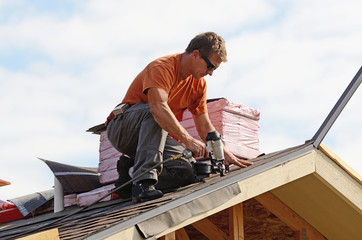Roofing professionals may be equipped with a variety of tools and equipment. In addition to ladders, roofers use utility knives, hammer tackers, and crowbars to remove old shingles. They may also use power equipment, such as a nail gun, to lay down new roofs. Power nailing machines make laying roofs faster and easier, although many companies still use standard hammers. They must be experienced and not afraid of heights.

There are several important qualities of a roofing professional. Roofers must be skilled at installing various roofing materials and completing regular roof maintenance and inspections. They must adhere to industry standards and safety practices, as well as be able to estimate labor costs and materials costs. They must also be familiar with various roofing systems, including low-slope, steep-slope, and sustainable roofs. Roofing professionals have strong communication skills and a positive attitude, as their work will require them to interact with customers from all walks of life.
Depending on the area in which they work, a Roofer may install new roofs or repair old ones. They may use a variety of materials, such as asphalt or concrete, and can work on commercial and residential buildings. Roofers are typically outside, on the structure they are working on, and sometimes inside. During the hot summer months, they may work even longer hours. And for a variety of reasons, a career in this field can be rewarding.
Roofing professionals protect the walls of a building by applying a waterproofing compound. They measure angles with a chalk line or gauge on a shingling hatchet. Once the roof is in good shape, Roofers can use slate or tiles. They may also use waterproofing sheet materials to cover exposed nailheads. Roofing professionals also apply tar to damp-proof roofs. Roofing professionals may use a variety of tools, including hammers, knives, and power fastening machines.
A roofer must have a certain amount of carpentry skills and be comfortable working on tall structures. They must also be fearless of heights and possess a good balance. Roofers replace old materials and installations with solid structures that are safe to live on. Roofers work with a variety of materials, including wood, metal, and plastic. They may also install vapor barriers and layers of insulation to make the assignment water-tight.
Roofers also install and repair roofs. They take detailed measurements to calculate the materials needed for the job. When a roof is being replaced, roofers apply waterproofing agents and lay down shingles or other roofing materials. They may also hire helpers to help them set up ladders and hoist materials on the roof. Roofing contractors often use roofers as subcontractors for a building project, and the roofing workers work with certified building contractors.
Apprenticeship programs are available to learn roofing, and some companies will accept applicants who have no previous work experience. The training offered through an apprenticeship program includes classroom instruction and at least two thousand hours of on-the-job training. During this time, apprentices gain knowledge about the building and construction industry, the different materials used, and how the roofing process is performed. In addition to on-the-job training, roofers are required to be at least 18 years old.
Working as a roofer requires physical fitness. In addition to bending, kneeling, and lifting heavy objects, roofers must be able to withstand harsh weather conditions. While rain and cold weather aren’t the norm for roofing work, they are dangerous, and ice and snow can pose a threat to workers. In northern states, roofing work usually doesn’t happen during winter months. However, during the warm summer months, roofers may work overtime to get the job done quickly.
The roof is a vital component of human life and well-being. Roofers should be able to estimate the cost of the work required to restore a home’s roof. When you have this information, you can decide which contractors to hire for the job. A good estimate can help you decide between a top quality and a lower-priced contractor. So, what is it that a roofer should know about your home?